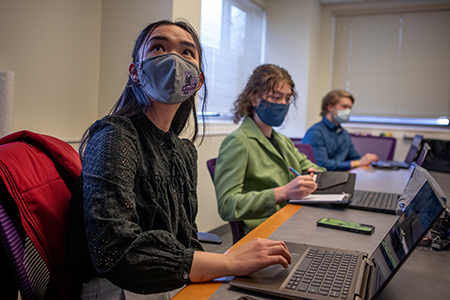Weber State Students Present Voting Preference Research to Lt. Gov.
OGDEN, Utah – Weber State University’s Social Issues Team researched the opinion of Utah voters and candidates about ranked-choice voting (RCV) compared to winner-takes-all (WTA) as part of a commissioned study for the Office of the Lieutenant Governor.
The team will report findings from surveys of candidates and voters to the lieutenant governor’s office on Feb. 16.
.jpg) The majority of Utah cities use the winner-takes-all approach; however, in the 2021 elections, 23 cities opted to use ranked-choice, which allows voters to select candidates by preference. If a candidate wins a majority, or 51%, of first-preference votes, they are declared the winner. If there’s no majority, the candidate with the fewest first-preference votes is eliminated. A new tally then determines whether any candidate has won a majority of the adjusted votes. The process is repeated until a candidate wins a majority.
The majority of Utah cities use the winner-takes-all approach; however, in the 2021 elections, 23 cities opted to use ranked-choice, which allows voters to select candidates by preference. If a candidate wins a majority, or 51%, of first-preference votes, they are declared the winner. If there’s no majority, the candidate with the fewest first-preference votes is eliminated. A new tally then determines whether any candidate has won a majority of the adjusted votes. The process is repeated until a candidate wins a majority.
In the commissioned research, Weber State surveyed 70 municipal candidates running in ranked-choice races before election day 2021 and found that Democratic candidates viewed RCV statistically significantly more favorably than those who identified as Republicans. Ranked-choice has two general effects on the election process: first, cities using RCV do not hold primary elections; second, candidates typically run without identifying their party affiliation.
The second study surveyed 700 voters about their perceptions of the 2021 election — 350 voters who voted in RCV elections and 350 who voted in winner-takes-all. This second study found that voters who participated in WTA elections responded more positively because of the ease and familiarity of the experience. However with RCA, voters liked the ability to choose among several candidates and felt the system increased voter voice.
“These findings illustrate that even though voters perceived the existing voting system (WTA) more positively, the new trial voting system (RCV) was still perceived positively by a majority of voters who used it. Said another way, voters liked the traditional system more, but were open to the benefits of the new approach to voting,” explained Ryan Cain, assistant professor of teacher education who helped advise the group.
The Social Issues Team is one of the newly created community engagement teams housed in WSU’s Center for Community Engage Learning and the research was conducted in partnership with the Olene S. Walker Institute of Politics & Public Service.
With faculty support, undergraduate students across campus led the research.
Students on the team include director Allana Soriano and members Emma Blanch, Liz Homez Gonzalez, Spencer Packard and Emily Moran.
 “Being involved in this research project has truly been an educational experience for the entire Social Issues Team,” said Soriano, a senior in athletic therapy. “I think it's great to see young students like us showing interest in learning more about the state's perceptions of our current voting systems and that we were able to provide insightful data that could potentially influence the way Utah conducts its election in the future.”
“Being involved in this research project has truly been an educational experience for the entire Social Issues Team,” said Soriano, a senior in athletic therapy. “I think it's great to see young students like us showing interest in learning more about the state's perceptions of our current voting systems and that we were able to provide insightful data that could potentially influence the way Utah conducts its election in the future.”
Prior research has examined RCV and its effects on elections. Findings have indicated mixed support, but this is the first research to offer a glimpse into the feelings of political candidates and voters in Utah.
According to the study, 93% of candidates had an understanding of RCV and were no or more less likely to declare their candidacy because a city used RCV in its elections. However, even though candidates who were surveyed ran in unaffiliated races, those who affiliated as Republicans generally preferred the winner-takes-all approach and viewed it as more fair.
According to this new research, both voting systems have benefits and drawbacks, with WTA voting being the preferred system, overall, among voters in the State of Utah.
“The Social Issues Team is fortunate to have had the opportunity to partner with the Lieutenant Governor’s Office on this project, which gave student team members real-world community engaged research experience, and provided findings that will hopefully aid the state in continuously improving voters’ participation in the democratic process,” said Alex Lancester, assistant professor of communication, and a team adviser.
The WSU team emphasized this is a first glimpse into the feelings and perceptions of RCV in Utah and additional study is needed.
For photos, visit this link.
Visit weber.edu/wsutoday for more news about Weber State University.
Allison Barlow Hess, Public Relations director
801-626-7948 • ahess@weber.edu- Contact:
Allison Barlow Hess, Public Relations director
801-626-7948 • ahess@weber.edu